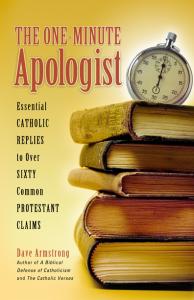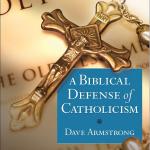I was looking over some of the more recent (and increasingly rare) writings of Bishop “Dr.” [???] James White (as opposed to his webcast). I found one with the title, “Do You Really Believe and Practice Sola Scriptura?” (4-30-22). In it, he stated:
But here is the test: when you encounter a key text that could, in fact, impact your currently favored theological position (especially if that position is the subject of controversy), do you alter your hermeneutical method so as to come to the needed interpretation?
When dealing with Roman Catholics, for example, and you are looking at Matthew 16:19, and you point out to the RC that δώσω is future, not present, tense, (“I will give” not “I am giving”) do they respond by appealing to an external authority rather than actually dealing with the text itself? Many of us have experienced this in doing apologetic evangelism with many groups.
The Greek word δώσω (dōsō) is one of many forms of the Greek word δίδωμι (didómi / “to give”): Strong’s word #1325. It appears 23 times in the NT in this form. See also the passage in side-by-side Greek and English. Here is the verse in RSV:
Matthew 16:19 I will give you the keys of the kingdom of heaven, and whatever you bind on earth shall be bound in heaven, and whatever you loose on earth shall be loosed in heaven.
I wasn’t exactly sure what Bishop White was insinuating by pointing out the tense involved with regard to Jesus giving Peter the “keys” so I searched his site a bit for clarification, and lo and behold, when he explained it further it was in a post directed towards me. The post in question is “Dave Armstrong: The One Minute Apologist“ (6-13-07). He wrote there:
The One Minute Apologist illustrates the same problem I have documented in the majority of the rest of Rome’s apologists: they do not have any desire to interact with the strongest criticisms of their position, but, for some reason, are more than content to repeat the same worn out arguments that have been offered, and refuted, over and over again in the past. And when they represent the “objections,” they do not present the best, the strongest, but the most mundane, the least compelling, as normative for “the other side.”
For example, Armstrong does not even seem to be aware of fundamental and fatal objections to his favorite arguments. He repeatedly asserts that Jesus gave the keys to Peter alone. On page 34 we read, “Peter alone is given the ‘keys of the kingdom of heaven’–a symbol of stewardship and supervisory capacity over the house of God, or the Church.” A footnote is attached pointing us to Matthew 16:19: “I will give you the keys of the kingdom of heaven; and whatever you bind on earth shall have been bound in heaven, and whatever you loose on earth shall have been loosed in heaven.” But there does not seem to be any recognition on his part of what I brought out over a decade ago in The Roman Catholic Controversy:
This statement is followed by the promise to, at some time in the future, give the keys of the kingdom of heaven to Peter, so that what he binds on earth will be bound in heaven, and whatever he looses on earth will be loosed in heaven. I emphasize this is a promise, for the verb is future in tense.[1] Yet, when we see this authority given in Matthew 18:18, it is given not to Peter alone, or even primarily, but to all the apostles, and that using the exact same language,[2] regarding binding and loosing. If someone wishes to say that Peter receives the keys in distinction from the other apostles, as their superior, they are also forced to admit that the giving of these keys is never recorded for us anywhere in Scripture, a strange thing indeed for something supposedly so fundamental to the constitution of the Church. . . .
So I took the time to scan Armstrong’s materials to see if he had addressed this issue elsewhere. I checked his The Catholic Verses and found that the discussion of the Papacy (55-61) is almost identical to what is found in this new book, but there is no recognition, or discussion, of the fact that you cannot cite Matthew 16:19 as indicative of Peter alone receiving the keys, and that despite the fact that my book is cited in the bibliography. . . . I would ask Armstrong: where in Scripture do we see the giving of the keys to Peter alone, as he claims? We all know this is the Roman claim. Outside of the self-serving interpretations of the bishops of Rome, upon what basis are we to accept this claim? And if Armstrong wishes to be taken seriously as an apologist, why does he not write in such a way as to indicate a growing, deepening knowledge of the critics of the position he espouses?














